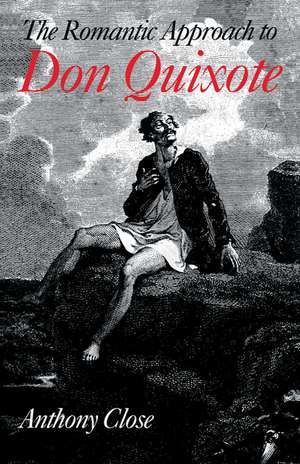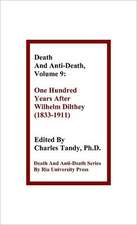The Romantic Approach to 'Don Quixote': A Critical History of the Romantic Tradition in 'Quixote' Criticism
Autor Anthony Closeen Limba Engleză Paperback – 7 apr 2010
Preț: 322.41 lei
Nou
Puncte Express: 484
Preț estimativ în valută:
61.69€ • 64.58$ • 51.35£
61.69€ • 64.58$ • 51.35£
Carte tipărită la comandă
Livrare economică 31 martie-14 aprilie
Preluare comenzi: 021 569.72.76
Specificații
ISBN-13: 9780521142588
ISBN-10: 052114258X
Pagini: 300
Dimensiuni: 140 x 216 x 17 mm
Greutate: 0.38 kg
Editura: Cambridge University Press
Colecția Cambridge University Press
Locul publicării:Cambridge, United Kingdom
ISBN-10: 052114258X
Pagini: 300
Dimensiuni: 140 x 216 x 17 mm
Greutate: 0.38 kg
Editura: Cambridge University Press
Colecția Cambridge University Press
Locul publicării:Cambridge, United Kingdom
Cuprins
Preface; Abbreviations; 1. Don Quixote as a burlesque novel; 2. The Romantics; 3. Cervantes and the chivalresque ideal; 4. Symbolic and allegorical criticism; 5. Unamuno, 'Azorin', Ortega; 6. 'El pensamiento de Cervantes'; 7. Perspectivism and existentialism; Conclusion; Appendix; Bibliography; Index.
Descriere
Don Quixote has been widely read and discussed outside Spain. Interpreted before 1800 as a burlesque of chivalric romances, and implicitly described as such by Cervantes himself, it was given a sentimentalised and seriously philosophical interpretation by the German Romantics. Dr Close is essentially concerned with the question why this unhistorical and subjective reading of the novel prevailed, first in Europe, then in Spain. He examines the stages by which, from 1860, it progressively supplanted in Spain the hitherto dominant neo-classical interpretation, and shows how this process kept pace with increasing identification with movements of intellectual history, aesthetics, literary criticism and scholarship in Europe. He clarifies the complex reasons which have led Spaniards to see Don Quixote as a symbol of their cultural history and identity, and reveals how preoccupation with Spain's decadence has coloured the interpretation of the national classic by leading Spanish critics, scholars and philosophers.














